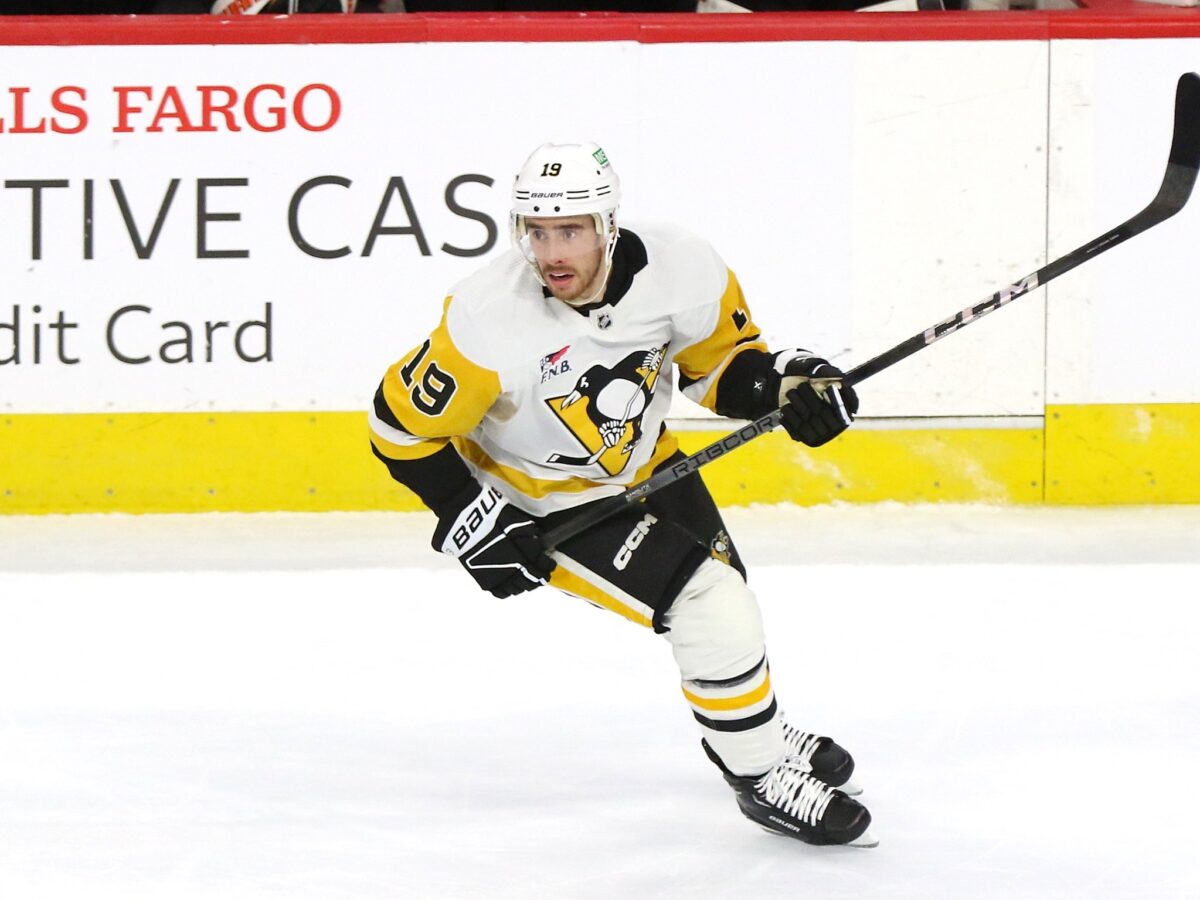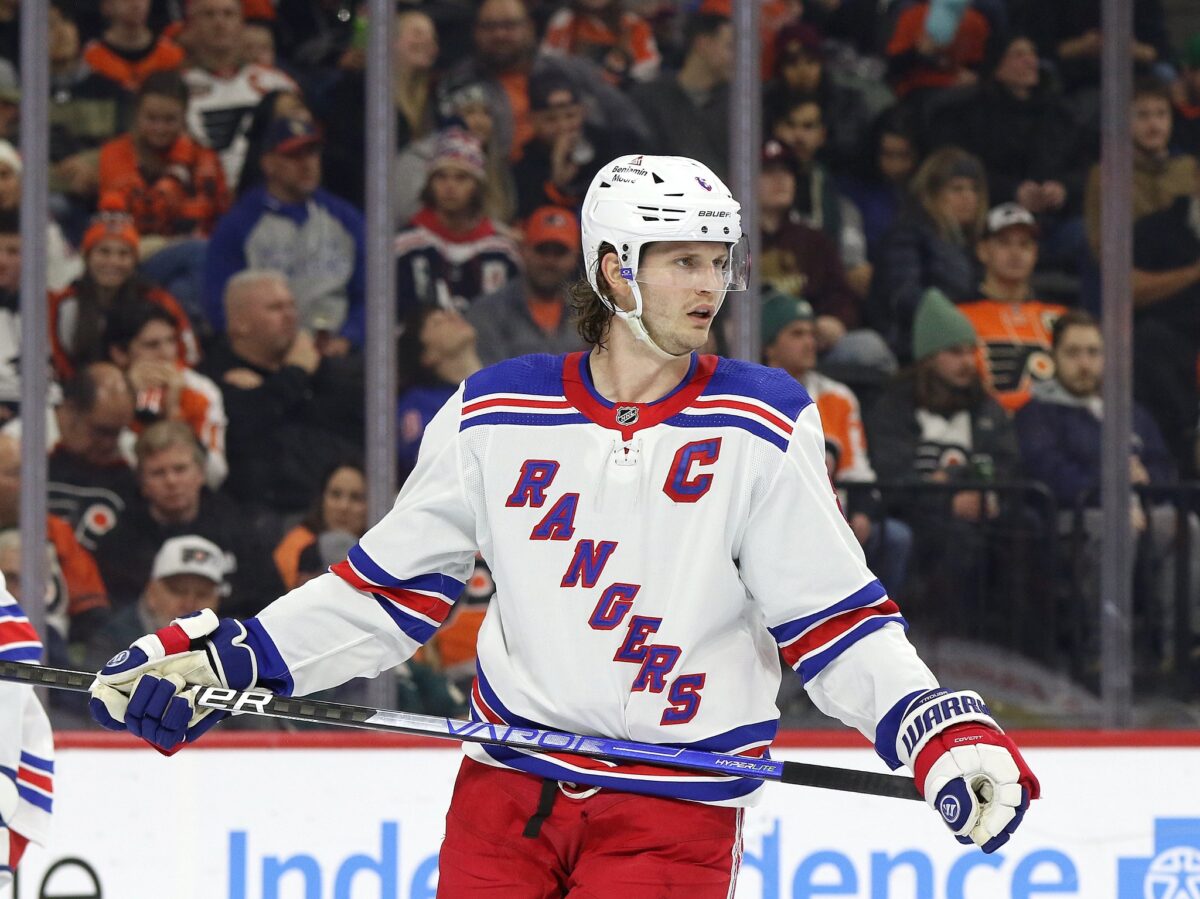After two days of free agency, the New York Rangers seem compelled to give their core another shot at the Stanley Cup, largely due to their tight cap situation, no-movement and no-trade clauses, and poor asset management. The most notable move was acquiring right winger Reilly Smith from the Pittsburgh Penguins in exchange for a 2027 second-round pick and a conditional 2025 fifth-round pick.
Smith, slated to join Mika Zibanejad and Chris Kreider on the top line, promises to enhance the Rangers’ offensive depth. Additionally, the team signed center Sam Carrick, who is set to replace Barclay Goodrow as the fourth-line center. However, the major story of the weekend revolved around defenseman Jacob Trouba. With an $8 million cap hit for the next two seasons, according to Larry Brooks of the New York Post, General Manager Chris Drury was reportedly close to trading Trouba to the Detroit Red Wings, but the trade seems to have fallen through.
Smith’s Acquisition: Enhancing Rangers’ Offensive Depth
Smith is a solid addition, especially considering his 40 points in 76 games last season, with 38 of them coming at even strength. He is also a consistent playoff performer. While not a point-per-game player in the postseason, his track record shows he can make a significant impact. With Zibanejad being paid $8.5 million for the next six seasons and Kreider making $6.5 million for the next two seasons, they should be able to elevate Smith, a quintessential middle-six winger, into a top-six role.

The Rangers desperately need consistent 5v5 scoring, making Smith’s even-strength contributions particularly valuable. However, Zibanejad and Kreider have struggled to elevate their linemates or drive play since Frank Vatrano, a pure goal scorer and shooter, joined their line. Zibanejad has expressed a desire for a playmaker on his line, but the most successful player alongside him and Kreider was Vatrano. The duo’s poor 5v5 performance cannot continue if the Rangers hope to be competitive.
While Drury should have aimed to acquire a true top-line winger in free agency or through a trade—Nikolaj Ehlers is still a possibility—the onus is now on Kreider and Zibanejad, particularly Zibanejad, to start playing like top-line forwards and not rely solely on power play scoring to boost their stats.
RELATED: Reilly Smith Fills the Rangers’ Need on the Right Wing
This situation only exists because of the worst move of Drury’s tenure: sending Pavel Buchnevich to the St. Louis Blues for Sammy Blais and a second-round pick. Buchnevich has been a near-point-per-game player who also kills penalties, a skill set the Rangers have sorely missed. The major concern at the time was his cap hit, but that could have been managed if not for the disastrous signing of Patrik Nemeth.
The Trouba Conundrum: Rangers’ Dilemma with a Costly Defenseman
The Trouba situation is complex and delicate, with much contradictory news. This article, however, will focus on what the Rangers should do moving forward. Trouba, quite frankly, has been a significant disappointment. Signing him to a 7-year, $8 million per year contract was a costly mistake. Without rehashing every detail, it’s important to note that Trouba’s performance in key moments has been detrimental.
In Game 3 of the 2022 Eastern Conference Final, he took three penalties that cost the Rangers the game and a 3-0 series lead. This season, his performance against the Florida Panthers in the Eastern Conference Final was similarly damaging, highlighted by a missed check that led directly to the first goal in Game 6, the final game of the Rangers’ season. Trouba’s contract has severely hamstrung the Rangers, preventing any meaningful changes this offseason. While it’s unfortunate that former General Manager Jeff Gorton gave Trouba such a long-term, high-value contract with clauses, these are the realities the team must navigate.

The Rangers have a few options to consider: they could find a trade partner among the teams not on Trouba’s 15-team no-trade list, buy out his contract during the second buyout window (saving $4 million over the next two seasons but costing $2 million for an additional two years), or waive Trouba and hope he gets claimed. If he clears waivers, the Rangers could bury his contract in the American Hockey League, which would only save them $1.15 million. Each option has its challenges and potential benefits. The Rangers must carefully weigh these to mitigate the impact of Trouba’s contract and improve the team’s prospects for future seasons.
Rangers’ Path Forward: Key Moves and Decisions for 2024
The lingering situation with Trouba remains a significant obstacle. His underperformance and substantial cap hit complicate the Rangers’ efforts to make impactful roster changes this summer. While Drury faces tough decisions regarding Trouba’s future with the team, finding a viable solution is crucial for improving the Rangers’ financial flexibility and overall team performance.
Moving forward, the Rangers must focus on optimizing their current lineup and make prudent decisions to correct past missteps. This involves seeking creative solutions to navigate their cap challenges and making strategic acquisitions that can genuinely enhance their competitiveness. If Zibanejad and Kreider can regain their top form and the team can address the Trouba dilemma effectively, the Rangers have a fighting chance to be contenders once more.
Management’s moves in free agency, highlighted by the acquisition of Smith, indicate an approach influenced by their cap constraints and previous asset management decisions. Smith’s addition is poised to address the Rangers’ pressing need for consistent 5v5 scoring, and his playoff experience could prove invaluable. However, the success of this plan hinges significantly on the ability of Zibanejad and Kreider to elevate their game and integrate Smith effectively into the top line.